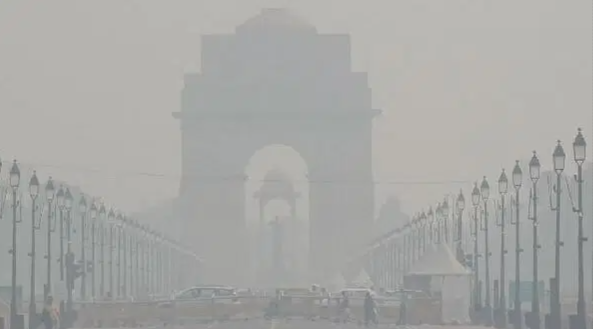
Smog, corruption, health risks, and political games: The dire reality of Delhi NCR
By Dr. Avi Verma, MD(h)
Delhi’s pollution crisis has become a recurring nightmare, with smog choking the city and health concerns rising every year. The Delhi government’s response? Imposing restrictions that seem more geared toward inconveniencing citizens and enabling systemic corruption than addressing the root causes of pollution. Unfortunately, I recently experienced firsthand how these measures have become a breeding ground for harassment and organized corruption.
A Firsthand Experience of Mismanagement and Exploitation
While traveling back to Punjab after a temple tour in Rajasthan, we passed through Delhi on November 18. Our journey began on November 14, before the vehicle restrictions imposed on November 15 came into effect. Despite this, we were stopped by traffic police, who claimed our car was not allowed in Delhi.
Our driver explained that we were merely in transit and had no intention of staying in Delhi. Yet, the officers insisted on issuing a challan of ₹42,000—an astronomical and intimidating penalty. The situation quickly turned into blatant extortion: the officers settled the matter for a bribe of ₹2,500.
Adding insult to injury, the police provided us with a “day code” on a piece of paper, advising us to show it to any other officer who might stop us within the next 24 hours. The implication was clear: this was a well-organized system of corruption, designed to milk money from travelers under the guise of enforcing environmental regulations.
Are the Rules Protecting Delhi’s Health or Perpetuating Harassment?
The government claims these restrictions are aimed at combating pollution and safeguarding public health. But incidents like this suggest otherwise. Rather than addressing the real culprits—industrial emissions, unchecked construction dust, and stubble burning—the authorities have turned travelers and ordinary citizens into easy targets.
For those merely passing through Delhi, the restrictions become an ordeal. There is no proper mechanism to exempt transit vehicles or to communicate clear guidelines. Instead, the system relies on intimidation, arbitrary fines, and organized corruption.
An Organized Network of Exploitation
The experience of receiving a “day code” highlights the shocking level of coordination among corrupt officials. This isn’t random misbehavior by a rogue officer; it’s a well-oiled system that preys on travelers unfamiliar with the rules.
Key Questions That Demand Answers
- Why is there no exemption for vehicles in transit?
- How are citizens and travelers expected to navigate unclear and poorly communicated restrictions?
- What steps are being taken to root out the deep-seated corruption in traffic enforcement?
- Why does the government focus on penalizing citizens instead of tackling the major contributors to pollution?
The Way Forward
To genuinely address Delhi’s pollution crisis and restore public trust, the following steps must be taken immediately:
- Clear Guidelines for Transit Vehicles: A transparent and publicly accessible mechanism must be established for vehicles passing through Delhi without stopping.
- Independent Oversight: Anti-corruption bodies should monitor the enforcement of pollution restrictions to ensure they are not being exploited.
- Focus on Real Solutions: The government should prioritize tackling industrial emissions, construction dust, and stubble burning, rather than imposing arbitrary restrictions on commuters and travelers.
- Zero Tolerance for Corruption: Officers engaging in extortion and organized bribery must face strict disciplinary action.
Conclusion
Delhi’s pollution crisis demands urgent action, but it cannot come at the cost of fairness, transparency, and public dignity. Harassment, exploitation, and corruption only add to the suffering of citizens, while doing little to address the real causes of pollution.
As someone who experienced this firsthand, I cannot help but question: Who is really benefiting from these so-called anti-pollution measures? The citizens of Delhi—or the corrupt officials exploiting them?
Arvind Kejriwal Lieutenant Governor of Delhi Narendra Modi Atishi Manish Sisodia CP Delhi